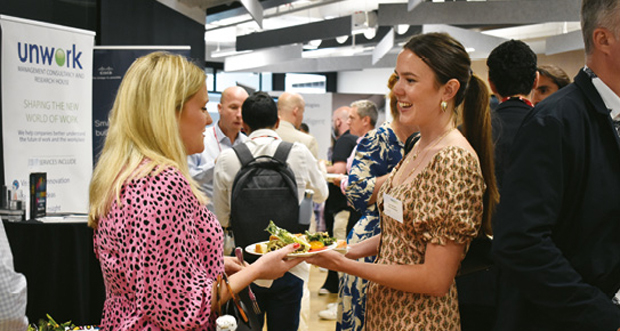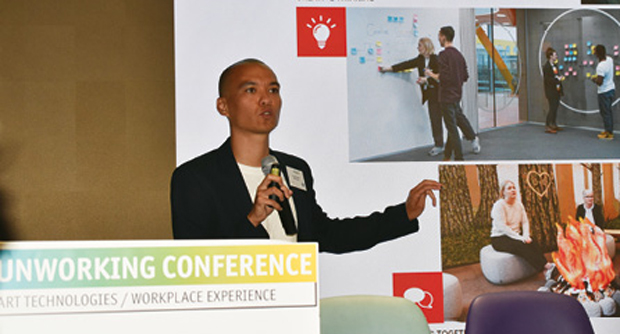Sara Bean and Craig Peters report from the London Unworking Conference which over two days explored the future of work, real estate, technology and innovation
In day one’s focus on Smart Technology and its impact on how we work and live, Matthew Marson, of JLL Technologies suggested that with office usage being challenging and expensive to measure, organisations need to be data driven in everything they do to make the right decisions. Developing this theme, Will Readshaw of Arcadis UK argued that with the war for talent being a huge issue for employers, providing an occupant centric space supported by interactive technology can reduce attrition rate and employee turnover by 27 per cent.
The importance of implementing a change management process from the beginning of a smart building project was the conclusion of a panel discussion on the best practices and lessons learned from a smart technology global rollout. “To ensure people have a similar user experience wherever they are, while managing lots of different drivers and stakeholders, it’s essential to aggregate all of the process into a viable communications strategy” the panel concluded.
During a session on innovation in real estate, Chris Higgins, Senior Programme Director, Workplace Real Estate & Facilities for GSK described plans to transform the employee experience.
“When we were looking at the role of our offices and how we could get people back into the workplace, instead of looking at performance in the office we thought about how we could improve staff health and wellbeing both inside and outside the workplace, as 60 per cent of the time they’re not going to be in the office.”
Moving from its Brentford offices to a brand-new building in central London, GSK’s new workplace is being designed from the bottom up, with opportunities to socialise in the lower levels and executive suites, areas for fitness and mental health at the top of the building.
Higgins also noted: “We started our change management on the day we announced where we were going, creating a space in GSK house with all the different technologies, asking our employees ‘how do you want to work?’ and measuring the outcomes.”
WORKPLACE EXPERIENCE
A new paradigm is emerging regarding the dynamics of office spaces in UK facilities management. Rather than adhering to rigid routines of being physically present at the office, employees are now embracing a more flexible approach that combines in-person collaboration and social interaction with remote work. This was the consensus of day two at Worktech’s Unworking Conference, hosted at Accenture, London.
Tim Ahrensbach, Head of Workplace Experience at The LEGO Group, took the audience on a journey of LEGO’s ‘best of both’ hybrid strategy and its much-admired campus, which opened in March 2022 in Billund, Denmark. It has been likened to a “mini city,” and has been meticulously crafted to cater to the needs of the company’s 2,000 local employees as well as visitors from LEGO’s global workforce of approximately 17,000.
Each neighbourhood within the LEGO Campus caters to the concept of ‘activity-based working,’ offering a diverse range of spaces to accommodate the varied needs of LEGO’s workforce.
Notably, the LEGO Campus does not endorse the notion of permanent workspaces. Instead, it fosters a sense of community and collaboration through a dynamic hot-desking environment. With an impressive ratio of 1.5 spaces per employee, the workforce should always find a suitable area to carry out their work effectively. This innovative approach not only encourages flexibility but also ensures that the workspace remains dynamic, reflecting the evolving needs of the LEGO Group’s workforce.
Joe Ryle, Campaign Director of 4 Day Week, spoke candidly to the audience about the 4 Day Week movement. Surprisingly to me, just one person in the audience confirmed their organisation was trialling a four-day week, with one other (me) trialling a 4.5-day week.
“Atom Bank’s four-day working week has led to a 500 per cent surge in job applications and boosted staff morale,” he said. “Furthermore, a four-day week is something that organisations can get on with without government intervention. We see burnout and stress because culturally, we are addicted to work. We need to tackle the root cause of burnout, which is we are working too many hours.”
The findings from organisations trialling a four-day week have resulted in a 71 per cent reduction in burnout, anxiety and fatigue and there has been a 57 per cent improvement in job retention.
When it comes to experience, Adam Scott, Founder and Global Creative Director of FreeState, which advises on workplace and organisational culture, said: “By learning from the best in various fields, we can craft remarkable experiences. Whether it’s a vertical campus, like the impressive 34-storey ASP, or Nike’s world HQ with its interactive Serena Williams building, innovative ideas alone are not enough. It’s essential to bring all aspects together for a cohesive and impactful supply and demand experience.”
He asserted nicely towards the close of the event that “we need to better focus on what we’re doing all together across all of our departments to create these moving, attractive, evolving, and belonging experiences”.
As both days taught us, without engaging all your stakeholders to help create a welcoming and social atmosphere, no amount of tech is going to win people over.






